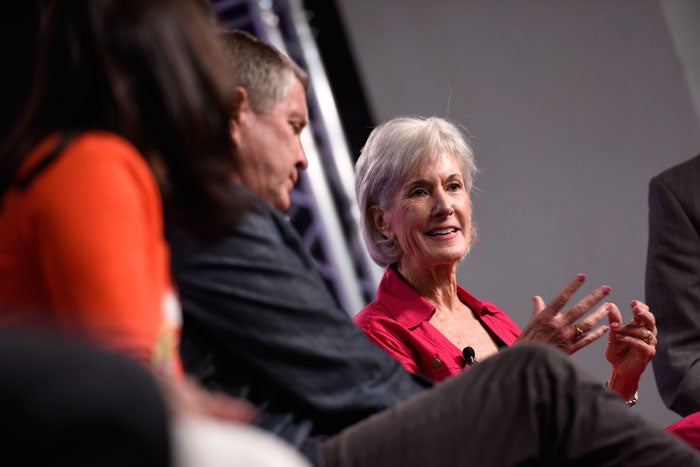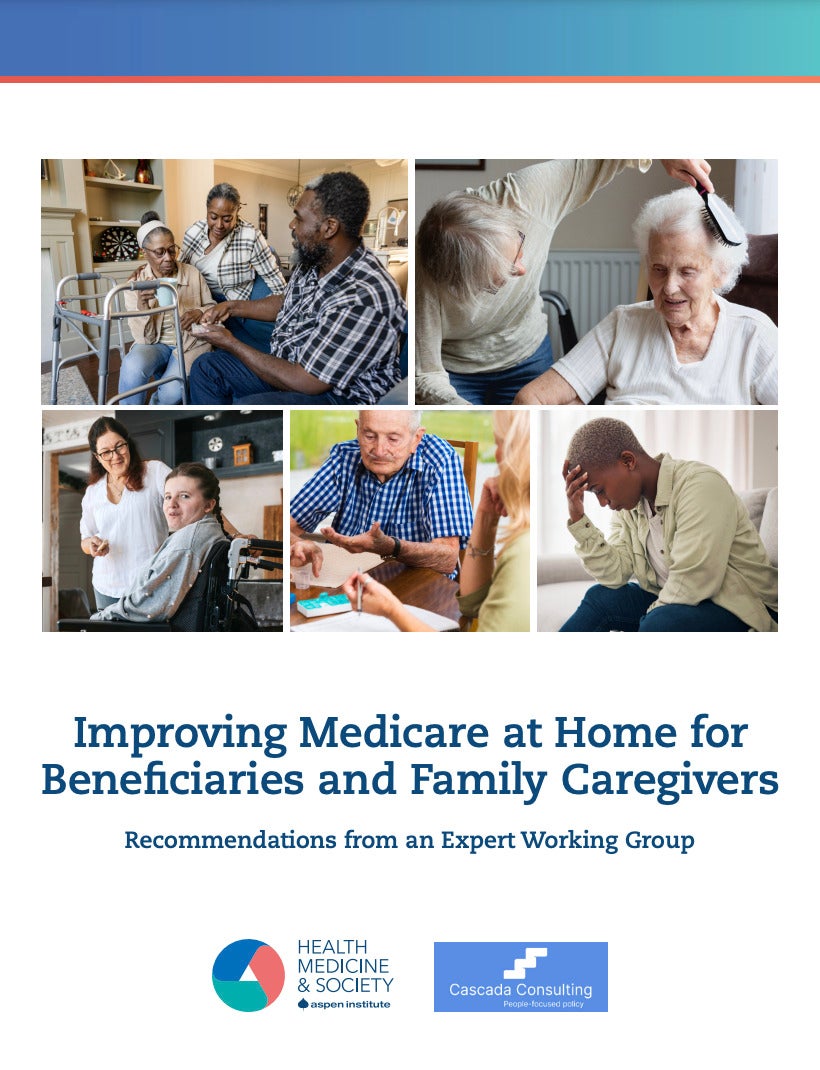On Thursday, June 25, 2015, the United States Supreme Court ruled 6-3 that the subsidies in the Affordable Care Act — popularly known as Obamacare — were constitutional, ending a five year legal battle over the legislation in resounding fashion. The following day, Spotlight Health — part of the Aspen Ideas Festival — convened a panel of political leaders who were intimately involved in creating, debating and ultimately passing the Affordable Care Act to discuss the ruling. The panel included former U.S. Senator Tom Daschle (D-SD), former U.S. Senator Bill Frist (R-TN), former Congressman Henry Waxman (D-CA), former Health and Human Services Secretary Kathleen Sebelius, and Nancy-Ann DeParle, who served as the director of the White House Office of Health Reform during the bill’s negotiation and passage. The conversation was moderated by Steve Clemons, the Washington editor of AtlanticLive.
MR. CLEMONS: Good morning, everyone. What a difference a day makes. Just about this time yesterday a decision came down on the Supreme Court that gave me the pleasure to be here with this outstanding panel.
I was talking to Tom Daschle a moment ago about which direction we should take this, and he said, “It really ought to be ‘the what’s next panel’.”
So we had a decision, which we’re going to discuss in a moment. But it raises as many questions about what are now the next layers of undone responsibilities in the health care arena, things that aren’t part of these kinks in the system.
Let’s begin with Kathleen to give us just a quick snapshot of what the decision yesterday did, and what it left undone?

MS. SEBELIUS: Well, the decision in the King v. Burwell case was really about four words that are in the statute and whether or not they should be the prevailing words in the statute. And those four words are “established by the state.” King, the plaintiff, suggested that those four words should be interpreted to mean that only individuals who were in an exchange established by the state should be entitled to tax subsidies, no one else should be entitled.
So 34 states actually use the federal marketplace as their method of enrolling and engaging in the Affordable Care Act, and 17 states have their own state marketplaces. So what was at stake really was 34 states — 6.4 million people in those 34 states — who have subsidized insurance policies.
And if the court had indeed ruled for the plaintiffs, people in those states would be subject to losing their subsidies, which made their insurance affordable, and consequently losing their insurance. But well beyond that, as if that wasn’t dramatic enough, the people who have had insurance coverage for a couple of years could lose it and then they and their families would become once again uninsured. The entire individual insurance market in those states, because of the rules for the Affordable Care Act, have one large risk pool. So even if you weren’t in the marketplace, if you were an individual in Alabama or in Kansas or in Texas who purchased your own health insurance in the individual market, those customers dropping out of the market suddenly would mean that insurance rates would skyrocket. You suddenly would have a very unbalanced risk pool. And it’s exactly what the individual market used to look like, where rates went up each year; younger and healthier people dropped out of the market; old and sicker people stayed in the market; and the individual market was on a slow death spiral.
This would be a very rapid death spiral in those 34 states. So the case had a lot of economic consequences, certainly a lot of individual consequences, a lot of consequences for hospitals and doctors who now counted on that payment system and a lot of consequences for insurance companies, who for two years have been in that competitive market and suddenly would be looking at a very dangerous and precarious financial situation.
So there was a lot at stake. John Roberts, Chief Justice, wrote for the majority in the 6-3 decision. And he basically said “you need to look at what Congress intended.” Congress intended to help fix the insurance markets, not destroy the insurance markets. You have to read the decision in its entirety.
And I would say it’s the strongest possible decision. They could have said, “We’re only deferring” or “We’re letting the administrative ruling stand,” which would have meant that in subsequent administrations a new IRS could say, “Well, we see this very differently.”
MR. CLEMONS: So this is definitive?
MS. SEBELIUS: This is definitive. They said ‘this is what the law says and it is constitutional.’
MR. CLEMONS: Let me quote — you know, I sort of collect beautiful prose that’s snarky yet that praises something. And Bill Frist has something that would go in my hall of fame that he wrote last night. So I’m going to read Bill First’s line here. It says, “The Affordable Care Act, with today’s decision, settles firmly and securely into institutional and cultural permanence. ‘Obamacare’ graduates now from political toy to the policy stature of Medicare and Medicaid. The decision signals that ‘Obamacare’ grows up and now becomes the ‘Affordable Care Act.’ It is woefully imperfect because of the miserable way it was initially written and passed, but after five years the new certainty for insurance markets will permit a maturity of risk pools, and the more direct and predictable provider reimbursement will eliminate much of the inefficient cost shifting that has obscured pricing and value transparency in the past.”
So Bill, give us a snapshot of what you saw as the stakes of yesterday’s decision. And how — were you surprised at the robustness of the decision?
MR. FRIST: I think Kathleen summarized it very well, and the one-liner from Justice Roberts will be the one that we come back to in terms of the insurance market’s intent. And that we really are all in this to bolster insurance markets. And I think he captured it, captured it better than the legislation and the law actually did initially.
I look at it pretty simply: we have the reality of the ruling. Then we have the politics, you know, what are the implications for the future of the elections from a political standpoint — the world that many of us have come from. And then the substantive policy end of it. And those are sort of the three buckets a simple surgeon thinks in. The reality is it changes nothing. The six million people aren’t going to lose their insurance. No law has been changed. The law is out there.
Which is a good thing because, as Kathleen says and as I mentioned in my piece or it may have been in that part, it brings an element of certainty to political figures who are answering to people who don’t like Obamacare for the most part.
And then the substance it opens up — there are things we need to fix that we can come back to as we talk that I think are really important. But the reality is no change. The political end of it is big because it says the courts are no longer going to be the battlefield.
MR. FRIST: It’s going to be in the political arena. And on the substance we have some great things to be done, but it’s going to require all of us working together and that’s going to require a new president of the United States in the next election.
MR. CLEMONS: So before I leave you, just about everybody you used to work with is running for president. What would be your counsel, because this now affects the political terrain, particularly if you’re a GOP contender?
MR. FRIST: It really comes down to this: 42 percent of people as of today don’t like it. Thirty-nine percent do. And if you’re trying to fix something, if there’s uncertainty out there, you can hide behind the sort of vague “well, a lot of people don’t like it.” The fact we have more certainty today because the courts are out of it now. There will be some little court decisions, but it’s no longer in the courts. It’s in the politics, in the substance of it.
Now, our elected leaders — coming back to the presidency — are going to have to come out and say “we’re going to work together to fix this.” It was passed in a partisan way — blame Republicans as much as Democrats. But whenever you pass an unpopular piece of legislation in a partisan way, whenever there’s difficulty, people run from it and say, “Those guys did it; we didn’t.”
There have been two elections. There’s going to be a third. And most of the people elected — the new people were elected not liking Obamacare. Why? Because most people don’t like Obamacare. That sort of cloud out there means it’s going to stay a political issue out there. It’s intimate. Healthcare is going to affect everybody. So it’s going to stay a political issue.
The answer I think is whoever is going to be president is going to have to come after the election and basically say ‘we’re going to bring people together.’ The Republicans in all likelihood are going to still be opposing, maybe repealing and changing. It’s going to be incumbent upon them to be very specific on how they are going to replace it or the American people aren’t going to buy it.
And the Democratic leaders are going to have to say there’s some difficult things in there — because remember most people don’t like it. Democrats may love it, but most people don’t like it. They are going to have to come out and say there’s some bad things in there that we need to fix and we need to come together to fix it. I think a lot of this will come down to the state level in terms of where the focus, the political action is going to be. Now that some of the uncertainty — the judicial element — has been removed, I think that is going to empower a lot of people who were against exchanges, against Medicaid expansion. All of a sudden with the uncertainty — the permanence established that it has reached the stature of Medicare and Medicaid — we will have some confidence in coming to the table and actually picking up the pace.
MR. CLEMONS: So before I jump to Nancy, let me ask Tom Daschle and Bill Frist to say what do you think Mitch McConnell’s next moves are and I’m going to ask Henry Waxman what do you think John Boehner’s next move is?
MR. DASCHLE: Well, I think Mitch is probably still going to be under pressure from a lot of his far right, the presidential candidates in particular to schedule at least one more repeal vote. They are going to want to make yet another statement not because they think it’s good politically in November of 2016, but it’s good politically for their base. They want to keep their base energized and they use this legislation as the way to do that.
In the longer term I don’t think that’s going to work. And if I were McConnell, I would work on those things that actually might bring Democrats and Republicans together. We saw it already with the sustainable growth rate, which brought a huge vote together. And we saw it with the extension of the community health centers. We saw it in the House with 21st Century Cure. So there are elements that are a little optimistic here.
And I think what the American people really want to see is Congress working together. And they are not going to work together right now on the ACA, but there are a lot of parts — there’s a lot of bipartisan agreement on payment reform and the need to move away from fee-for-service. There’s a lot of agreement on transparency, the need for greater transparency than what we have today. I think there’s a lot of interest in changing the way we deliver care.
My point I guess is that once you get beyond this emotional debate about ACA or Obamacare, it’s amazing how many things out there might have the potential for some reasonable dialogue and some consensus.
MR. CLEMONS: Henry?
MR. WAXMAN: Your question to me was what John Boehner would do. Well, we voted over 50 times in the House of Representatives to repeal the law. So I guess they could vote another time to repeal the law. Nancy-Ann and I were talking about whether the Senate ever had such a vote. Maybe McConnell will put that to a vote and everybody can then say, “I voted to repeal the law. I have no responsibility for it.” Then we all move on.
Now, the Republicans dodged a bullet yesterday, because in those red states they would have had to figure out what to do with the middle class who now have health insurance. The opinion polls show that most Americans did not want the court to go the other way. In the past, Obamacare was an abstraction. Many seniors came up to me and said, “I don’t want Obamacare. I don’t want government healthcare. I want my Medicare, leave it alone.”
(Laughter)
It was all an abstraction. But yesterday’s decision, had it gone the other way, would no longer have been an abstraction. People who finally had insurance would no longer have that insurance. So the Republicans can express their opposition and we can move on to areas where we could get bipartisan support. And I’m encouraged that the Congress is now moving in a more bipartisan way in the health arena and I do not think it’s because I left.
(Laughter)
MR. CLEMONS: I just got a quick lesson from Nancy-Ann and Kathleen over breakfast about what the cost of a repeal would be. And on June 19th a report came out from the Republican-supported director of the Congressional budget office, which brought the very uncomfortable notion that even with dynamic scoring the cost of repeal would be about a $137 billion, without dynamic scoring $353 billion.
Nancy-Ann, how does that impact the debate? Because that’s not an overexposed data point.
MS. DePARLE: Well, it has a huge impact. It hugely changes the debate I think and the question about what does Senator McConnell do. Because he has had a team of people working on how to repeal the law using reconciliation which would only require 50 votes in the Senate. To use reconciliation you have to be able to show that you reduce the deficit. This is not going to reduce the deficit.
So I think it does lend credence to what Tom suggested, which is that if I were Mitch McConnell — and I think Tom had suggested this too — I would just take a simple repeal vote and move on and get on to things that you can work on that are more progressive and positive.
One of the most irritating criticisms of the law to me is that it didn’t have any impact on costs. And I see people like Sister Carol Keehan sitting in the audience who is working with hundreds of Catholic hospitals across the country and I think she can tell us that it had an impact on costs.
They had to rein in their costs considerably. You know, the CBO’s analysis certainly underscores that this law is beginning to bring down cost, beginning to do some of the right things in improving quality. So repealing it would be the wrong step.
MS. SEBELIUS: I think Nancy-Ann is absolutely right. The mantra is “this is busting budgets, costs are out of control.” We have had the lowest health inflation in 50 years, the lowest sustained health inflation. And that’s not just individual insurance prices going up at a slower pace. It’s overall healthcare cost. It’s private employer cost.
We are finally in the ballpark of starting to trend relatively near GDP with health inflation. It used to be double the GDP. It has come down. The first couple of years people said, “Oh, it’s all about the recession. It’s won’t last.” It has now been five years and it continues to trend in a very positive direction.
MR. FRIST: How much — well, every other country has seen the flattening of cost and there’s a huge debate how much is structural, how much of it is recession. And I’ve kind of come out that half of it is recession and half of it is structural because there’s huge structural reform going on.
How much of the — first of all, the cost savings if you repeal Obamacare — because with all the tax increases that go with the repeal, of course it’s going to cost a fortune. And I’m not a repeal person. I don’t think a lot of substantive thinkers recognize repealing for the reasons that Henry said. Unless you have an alternative that’s compared to the Affordable Care Act as we know it today, not in the pre-ACA world, but today: the ACA world has become the standard. It’s institutionalized. It’s culturally there. It’s not popular.
So you say ‘how could these crazy Republicans take this to another vote to repeal it when it’s so impractical?’ Remember, the American people do not like this bill. There are more people who regard it unfavorably than favorably. And if you are a politician who wants to get elected, voting to repeal it is not crazy.
MR. CLEMONS: Is there a Cruzcare out there or something?
(Laughter)
MS. SEBELIUS: Well, they have an alternative. They have always said just run a large risk pool, just go back to the old days.
MR. WAXMAN: I would just say, I think what people are doing, they are listening to their political leadership. If you’re a Democrat, you’re going to listen to your Democratic leadership. If you’re Republican, you’re going to listen to everybody from Mitch McConnell on down saying how bad it is and you’re going to say, “Well, they say it’s bad.” But then you ask them, “Well, what do you think about the fact that you can’t ever be dropped again?” “Oh, I love that.” “What about the fact that your children can sign up to your parent’s claim?” “Oh, I love that. Is that in there too?” “What about expanding Medicaid, the people that otherwise could never have any access to insurance?” “I love that.” “So we’re talking about the Affordable Care Act, you know?” “Well, I don’t care what it’s called. I love those things. I just don’t like the Affordable Care Act.”
MS. DePARLE: “What don’t you like?” “I don’t like the Obama part of Obamacare.”
MR. WAXMAN: Somewhere along the line despite the propaganda words that people use in talking about this issue, there ought to be an examination of the facts. One of the objectives of the law was to reduce the number of uninsured. That has happened dramatically. The second objective was to reform the healthcare system by all the incentives to change from pay-for-quantity to pay-for quality to hold down cost by making healthcare more efficient.
We were told more by Republican leaders in the House — so I won’t blame Senator Frist — but we were told more people will lose their health insurance if Obamacare is continued. Not true. More people will lose their jobs. Not true. It will break the budget. That wasn’t true. So at some point people have to evaluate what has happened with this law. And I think by any measure it has been a great success.
Now, the Republicans can say, “Obamacare, we hate it.” But as Tom Daschle said, you go through all the parts of it and now it’s a reality for millions of people, I think they are going to start thinking that perhaps when they hear the mantra “this is a terrible thing that has happened,” people are going to just say, “Well, yeah, I don’t like Obamacare, but things are happening in the right direction.”
So somewhere before elections you would hope that people will look at what the reality is, not just what the propaganda says it is.
MR. CLEMONS: Let me ask Nancy-Ann and Kathleen for a minute something and I want you to pretend that we do not have a thousand people in the room and that this is a small confessional of just us and share with us now that the Supreme Court decision has made this definitive: What did you get wrong? What wasn’t in the Affordable Care Act that should have been? What were the things that, now that we’ve had five years of history, you wish had been a part of this package that weren’t?
MS. DePARLE: Well, from my perspective — I thought about this a lot and the one thing I would change would be to have had some Republican support for it. And, you know, we did everything we could. I spent hundreds of hours personally; the President spent a lot of time meeting with Republicans; Senate Chairman Baucus and his team, too. You know, the law was famously delayed in the summer of 2009, in part because he was spending so much time trying to get Republican support.
And while that was extremely annoying and frustrating at the time we were going through it, you know, not a day has gone by since the law passed that I haven’t wished we had had Republican support. That would have made all the difference. We might have still had, you know, attorneys general in various states bringing lawsuits, but it would not have been nearly as ugly as it has been and we would have been able to address some of the problems that needed to be addressed as time went on.
MR. CLEMONS: What would be your list of two or three things that need to be tackled then?
MS. DePARLE: I don’t know that I have a list of two or three things, but there are areas where — well, the language at the heart of King v. Burwell, “established by the state.” I will tell you a story. So after we passed the law, about a week after the president signed it, I called together our big team at the White House and HHS and Labor and I said “everyone bring your list of technicals.”
So we had a big stack of things that they would fix. I don’t think the “established by the state” was in there because no one thought it was an issue. And one of the guys from our legislative affairs office came in to the meeting and we were walking through each issue and he goes, “What are you doing?” And I said, “Well, we’re getting ready for the technicals bill because there will be a technicals bill, right?” There always is after a big bill passes.
And he looked at me and he goes, “You don’t get it, do you? This is it. They are not going to allow us to make these kinds of changes.” I kept the list because I kept thinking eventually we will all sit down and we will go through and work on these things together.
After the Medicare Modernization Act passed with the prescription drug benefit that many Democrats opposed, there still was, you know, a technicals bill. There still was an effort to work together, and I expected that. And that’s I think the thing that we mainly — we failed at.
MS. SEBELIUS: I don’t disagree with Nancy-Ann that that was a fundamental issue. I do think at some point the president had to make a call to go or no go because everything under the sun had been tried and it was clear there wasn’t going to be support. And then the Scott Brown election made it even harder. So there was only one way to get the bill through, which was to go back, have the House take the Senate bill, which was, as Henry can attest, no easy feat because the Senate version of the ACA and the House version of the ACA were very different.
MS. SEBELIUS: The most remarkable room I ever sat in was a room where the president actually was negotiator-in-chief with the Democratic leaders in the House and the Democratic leaders in the Senate for about eight or nine days in a kind of conference committee reconciling these bills. So we knew what a great bill would look like, and then the Scott Brown election happened and that was no longer a possibility. I think there are lots of issues, administrative issues, you know, the debate about how much paperwork an employer should file, how you get to documentation, how big the market should be, whether you take the small market definition up to a hundred people, I mean those kinds of things need to be put on the table.
MR. CLEMONS: But do we have an environment where those fixes can happen?
MS. SEBELIUS: Well, that’s the problem.
MS. DePARLE: Not until 2017.
MR. FRIST: Medicare was not passed this way, Medicaid was not, Social Security was not, welfare reform was not, Obamacare was. The problem is that in the five years since it was passed in a partisan way, it gets increasingly partisan. When the American people don’t like it because you are electing more and more people who basically say, it’s not my bill.
And the point is that it’s a good bill, good substance, but you always have bad things in it. We haven’t been able to fix the bad things over the last five years because you can’t work together. I know you tried, and it didn’t work. But if it had worked, these fixes would have come along, it would be a much easier process.
MR. DASCHLE: Steve, let me just say, we know we have three big problems. We have an access problem that we addressed, we have a cost problem that we’ve talked about, we have a real quality problem. This is legislation that is not aimed to address all three, although the insurance side, the access has gotten the bulk of the attention in the first five years.
MR. DASCHLE: Now we are going to move on to payment reform, to deal with cost, moving off of fee-for-service, coming up with innovative new ways to address cost and control it a lot more effectively.
And then to deliver reform to address quality. We still have a mess out there in measuring quality. We’ve got to figure out, if we are going to really talk about value, we’ve got to find ways to be able to measure quality, to assess value and that’s something that you are going to see a lot more of as we go forward. We are going to have new tools to do that. There are two driving forces: policy and technology.
Policy and technology married together will help us address all of those challenges in the coming years.
MR. WAXMAN: All of the things that Tom Daschle just outlined that we need to do, the administration can do without Congress because demonstration projects were written into the bill and different models can be tried. And so we are going to just see things develop without Congress passing any new laws.
I think people are going to ask ‘if we are going to redo the health insurance in this country, why not take the model that most other countries have, which is a single payer, the Medicare model?’ The reason we didn’t is because the president tried to get Republicans and Democrats to work together so he chose the Republican model that was put forward against the Clinton Healthcare Bill, which was private insurance companies competing with each other in a marketplace where the consumer can make a choice. So he made this as modest and bipartisan as he could, the Republicans chose — notwithstanding enormous efforts — to not be part of it.
What can we change legislatively? I think we have to do what we can to get the states to pick up the Medicaid option. It’s ridiculous if they haven’t; it’s free money that helps their healthcare providers, millions of people who are uninsured and it would help the economy of those states. Pharma got too good a deal in this bill, and we need to go back and correct some of those problems, but even after we correct those problems, the big cost driver that we are now facing is the rising cost of prescription drugs. We have to come to terms with that.



